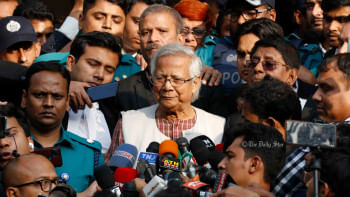Behind the World Bank's Padma Bridge loan drama

The World Bank is a major post-war financial institution providing conditional loans to its members. It has no agreement or overarching protocol to which all its members are parties that precisely articulates its underlying core lending principles and policies. This flexibility allows the World Bank to be arbitrary, discriminatory, and double standards in considering loan applications and setting loan conditionality. This flexibility also brings geopolitical and geostrategic consideration of its major western shareholders as the decisive factor in decision-making.
The US, being the largest shareholder with a de facto veto power on the decision-making, enjoys and exercises extraordinary power over the World Bank, which is used, more often than not, as an institutional tool to advance US interests and serve the cause of allies. Bangladesh has become the latest victim of this too formidable political pressure and influence which presumably compelled the World Bank to decline the Padma bridge loan on flimsy pretext of perceived corruption that judicially proved to be non-existent.
Examples of US political interference in the World Bank decision-making are numerous. Its lending to the Philippines continued notwithstanding repeated failures to fulfil loan conditions by a staunch ally of the US, the authoritarian Marcos regime, which favoured US multinationals to operate freely and greater export of US goods and capital into the Philippines at the expense of the socio-economic welfare of the people of that country. The World Bank granted multiple loans to the apartheid regime of South Africa in the 1960s as a mark of US and UK support for the regime despite the UN General Assembly resolution banning such loans. Despite the widespread support of its influential western shareholders, such as France, the World Bank could admit Vietnam as its members and grant loans until the lifting of the US embargo on Vietnam imposed since the US invasive Vietnam War. The World Bank had to grant Russia a substantial almost unconditional loan essentially to keep Russian President Boris Yeltsin, an ally of the west, in power and salvage him from the 1996 sure election defeat to socialists. This loan was widely dubbed as the 'Clinton Facility' (Economist, 2 Oct 1993, p 72). These examples are cited only to put the Padma Bridge loan saga in the historical context of power-politics dominating the World Bank, a congenital and structural deficit.
The World Bank's original mission was to serve the interests of western capitalism. Its third world development agenda is a subsequent policy-shift adopted not so much as an appreciation of the marginalised economic plight of the third world, but was dictated by the necessity of its very survival following the introduction of the Marshall Plan for European economic recovery. Its current neo-liberal policy of de-regulation, liberalisation, and privatisation has been transferring wealth from third world debtors to first world banks, which has contributed significantly to the ballooning inequality that now exists in the world economy. This strategy exports the crisis of capitalism in developed creditor-states abroad without requiring them to address their own domestic economic policy pitfalls and mismanagement that have caused successive global financial crises. It allows the inherent flaws of the free-market capitalism to continue without any need to reform to the system. Hence seeking and receiving loans for sustainable development like the Padma Bridge appeared to be a stretch of expectation from a financial institution that is highly politicised to behold and guard the US economic interests and political dictations.
The non-transparent and unaccountable operation of the World Bank, combined with the IMF, has quietly been transferring resources and funds from their poor debtors to rich creditors. A plain arithmetic calculation of their operation during the first 50 years (1944–1993) shows that the net transfer from debtors has outpaced what these two institutions together provided for their debtors, which 'have lost around [US] $500 billion per year in GDP as a consequence of these [neoliberal] policies' (Australia: The World Bank and the IMF, Australian Parliament Report, Canberra 1993, p 16; J Hickel, 'The Truth about Extreme Global Inequality' Al-Jazeera, 14 April 2013). Clearly the World Bank, in collaboration with the IMF, has been instrumental in expanding western capitalism, a role similar to what colonialism once played for rapid European development and industrialisation.
In response to mounting criticisms, the World Bank is showing some signs of amenability to reforms but its approach to reform is seemingly slow, piece-meal, and inadequate to abandon its original mission of guarding the wealth of rich states and resist the pro status quo force of vested interests – both economic and political alike. This is quite apparent from its handling of the Padma Bridge loan application. Its rejection on the ground of alleged corruption was perceived and pre-emptive as it was yet to release any part of the loan for the project. With all fairness to the World Bank, Bangladesh investigated the claim and found no existence of such corruption. Nor did the World Bank produce any tangible evidence of its alleged corruption. Finally, a Canadian court has recently found no evidence of the alleged corruption. The arbitrary decision of the World Bank has cost Bangladesh financially and damaged its image internationally. As a result, the outpouring of public resentment against the World Bank demanding its accountability in the mass media is understandable. The call for compensation and the High Court Division order of 'probe to find falsifiers' (Star, 16/2/17) with a view to bringing them to justice may not be gainsaid in the interest of accountability and potential future victims of power-abuse in the World Bank.
Bangladesh's decision not to take the Padma Bridge loan from the World Bank and to go ahead on its own was a costly but courageous response to challenge the traditional bullying pressure that US executives and their friends exerted on Bangladesh through the World Bank. Neither the World Bank nor the US enjoys the unfettered monopoly of power in global politics that they once used to deploy. They both now face competition from the recently established Asian Infrastructure Investment Bank. This perhaps explains why the World Bank has granted loans following the rejection of the Padma Bridge loan and the recent visit of Bangladesh by the World Bank President. Given its economic conditions going from strength to strength, Bangladesh has reasonable bargaining power to shop around and albeit avoid falling prey in geopolitical conundrum.
The writer is Professor of Law, Macquarie University, Sydney, Australia.

 For all latest news, follow The Daily Star's Google News channel.
For all latest news, follow The Daily Star's Google News channel. 




Comments